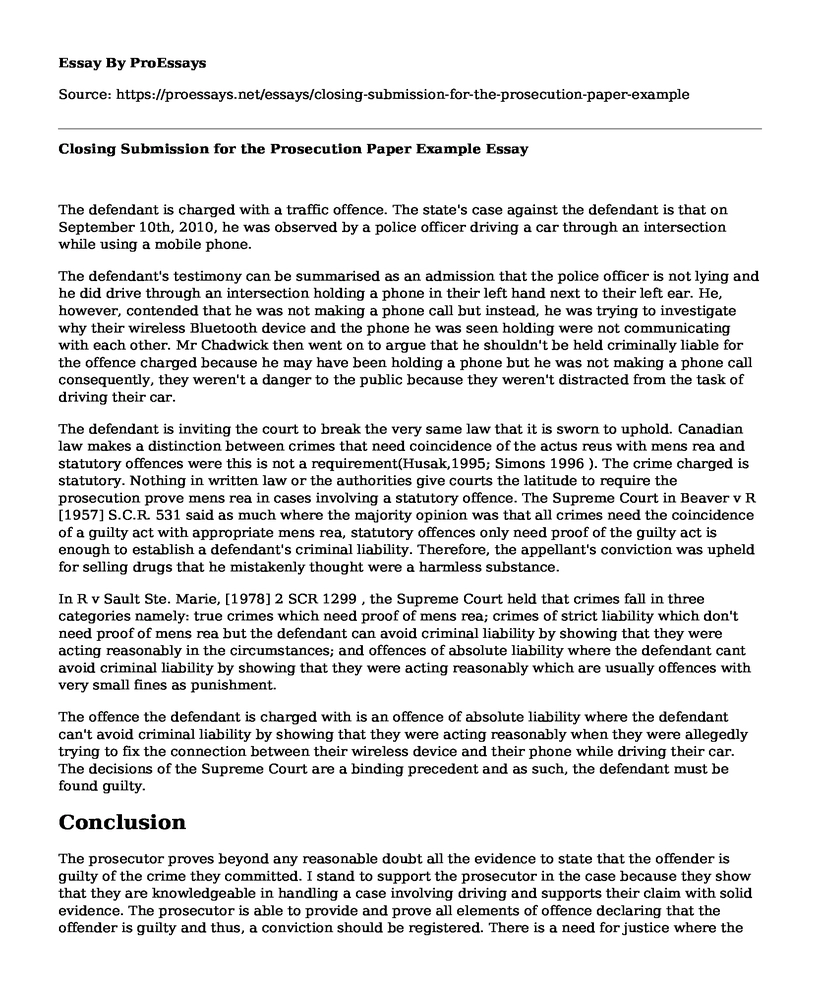The defendant is charged with a traffic offence. The state's case against the defendant is that on September 10th, 2010, he was observed by a police officer driving a car through an intersection while using a mobile phone.
The defendant's testimony can be summarised as an admission that the police officer is not lying and he did drive through an intersection holding a phone in their left hand next to their left ear. He, however, contended that he was not making a phone call but instead, he was trying to investigate why their wireless Bluetooth device and the phone he was seen holding were not communicating with each other. Mr Chadwick then went on to argue that he shouldn't be held criminally liable for the offence charged because he may have been holding a phone but he was not making a phone call consequently, they weren't a danger to the public because they weren't distracted from the task of driving their car.
The defendant is inviting the court to break the very same law that it is sworn to uphold. Canadian law makes a distinction between crimes that need coincidence of the actus reus with mens rea and statutory offences were this is not a requirement(Husak,1995; Simons 1996 ). The crime charged is statutory. Nothing in written law or the authorities give courts the latitude to require the prosecution prove mens rea in cases involving a statutory offence. The Supreme Court in Beaver v R [1957] S.C.R. 531 said as much where the majority opinion was that all crimes need the coincidence of a guilty act with appropriate mens rea, statutory offences only need proof of the guilty act is enough to establish a defendant's criminal liability. Therefore, the appellant's conviction was upheld for selling drugs that he mistakenly thought were a harmless substance.
In R v Sault Ste. Marie, [1978] 2 SCR 1299 , the Supreme Court held that crimes fall in three categories namely: true crimes which need proof of mens rea; crimes of strict liability which don't need proof of mens rea but the defendant can avoid criminal liability by showing that they were acting reasonably in the circumstances; and offences of absolute liability where the defendant cant avoid criminal liability by showing that they were acting reasonably which are usually offences with very small fines as punishment.
The offence the defendant is charged with is an offence of absolute liability where the defendant can't avoid criminal liability by showing that they were acting reasonably when they were allegedly trying to fix the connection between their wireless device and their phone while driving their car. The decisions of the Supreme Court are a binding precedent and as such, the defendant must be found guilty.
Conclusion
The prosecutor proves beyond any reasonable doubt all the evidence to state that the offender is guilty of the crime they committed. I stand to support the prosecutor in the case because they show that they are knowledgeable in handling a case involving driving and supports their claim with solid evidence. The prosecutor is able to provide and prove all elements of offence declaring that the offender is guilty and thus, a conviction should be registered. There is a need for justice where the court needs to come up with a good decision and they should think rationally, providing the best conviction for the offender.
References
Husak, D. N. (1995). Varieties of strict liability. Canadian Journal of Law & Jurisprudence, 8(2), 189-225.
Simons, K. W. (1996). When is a strict criminal liability just? J. Crim. L. & Criminology, 87, 1075
Cite this page
Closing Submission for the Prosecution Paper Example. (2022, Oct 08). Retrieved from https://proessays.net/essays/closing-submission-for-the-prosecution-paper-example
If you are the original author of this essay and no longer wish to have it published on the ProEssays website, please click below to request its removal:
- Supreme Court Declines to Hear Telecom
- The Most Recent Trends in Sentencing - Paper Example
- Martin Luther Kings and the Fights for Civil Rights Essay
- Essay Sample on Providing Free College Education for Prisoners
- Property Crime and Crimes Against People: What Do They Have in Common?
- Colorblindness: A Security Risk in Criminology & Airport Security - Essay Sample
- Saudi Arabia's Modernizing Criminal Justice & Political System - Essay Sample







